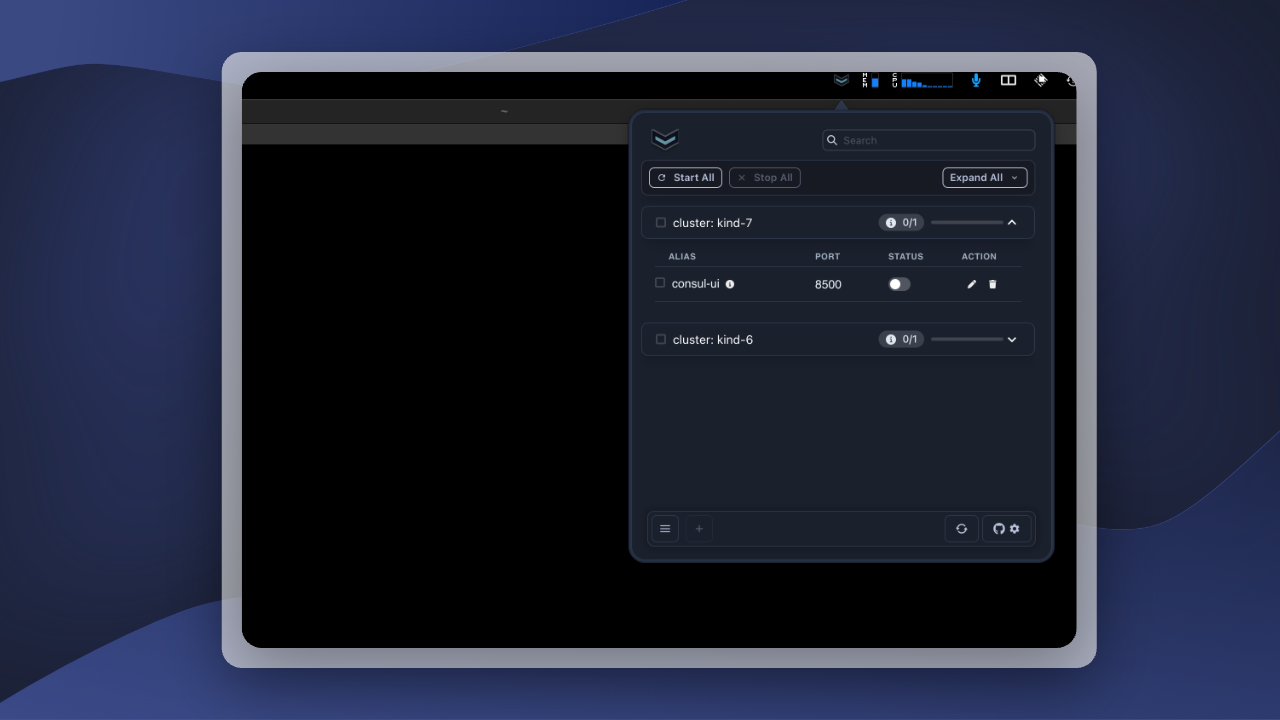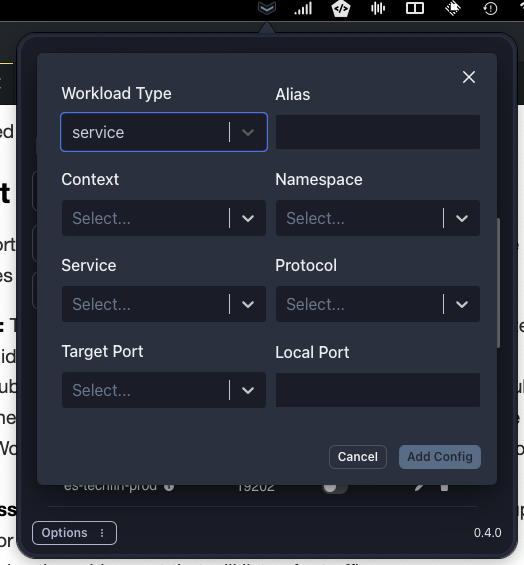KFtray is a cross-platform system tray app made with Tauri (Rust and TypeScript) for Kubernetes users. It simplifies setting up multiple kubectl port forward configurations through a user-friendly interface. Easily store and manage all configurations from local files or GitHub repositories.
- Resilient Port Forwarding Connection: Ensures continuous service even if a pod dies, by reconnecting to another running pod automatically.
- One-Click Multiple Port Forwards: Allows for the setup of several port forwarding instances at the same time with a single click.
- Independent of Kubectl: Directly interfaces with the Kubernetes API, eliminating the need for
kubectl. - Multi-Protocol Support: Enables access to internal or external servers through a Proxy Relay server deployed in a Kubernetes cluster, including TCP and UDP port forwarding.
- Import Configs from Git: Store and import configurations directly from Git repositories with a few clicks.
Install kftray with ease using Homebrew by tapping into the custom repository. Run the following commands:
For Linux:
brew tap hcavarsan/kftray
brew install --HEAD kftrayFor macOS:
brew tap hcavarsan/kftray
brew install --HEAD kftrayPlease check the caveats section for global app creation instructions after installation.
- Node.js and pnpm or yarn for building the frontend.
- Rust for building the backend.
To compile kftray, these steps should be followed:
- Clone the repository:
git clone https://github.com/hcavarsan/kftray.git
- Navigate to the cloned directory:
cd kftray - Install dependencies:
pnpm install
- Launch the application in development mode:
pnpm run tauri dev
Below is an intuitive guide to getting started with KFtray.
Use the UI to add new port forward settings. Necessary details include:
Workload Type: Proxy or Service.Alias: A unique name for the settings.Context,Namespace,Service: As per Kubernetes configuration.Remote Address: For Proxy type workload.Protocol: TCP or UDP.Local and Remote Ports: Endpoint details.
- Single Configuration: Click to initiate a single port forward.
- All Configurations: Start multiple port forward simultaneously.
Manage and share port forward settings:
- Export and Import: Quickly transfer configurations using JSON files.
- Git Synchronization: Seamlessly fetch configurations from a Git repository.
- Local Storage: Securely save configurations at
$HOME/.kftray/configs.db. - Server Pod Manifest: Tailor the Proxy Relay server manifests stored at
$HOME/.kftray/proxy_manifest.json.
Below is an example of an exported JSON configuration:
[
{
"alias": "consul-ui",
"context": "kind-7",
"local_port": 8500,
"namespace": "consul",
"protocol": "tcp",
"remote_port": 8500,
"service": "consul-ui",
"workload_type": "service"
},
{
"alias": "redis-gcp",
"context": "kind-6",
"local_port": 26379,
"namespace": "default",
"protocol": "udp",
"remote_address": "redis-prod.gcp.internal",
"remote_port": 6379,
"workload_type": "proxy"
}
]KFtray Server is a Rust application that relays UDP/TCP traffic to an upstream server. Check the source code here.
- TCP Forwarding: A local TCP socket, similar to kubectl, can be used to communicate with a Kubernetes pod. This approach offers parallel execution and improved resilience.
sequenceDiagram
Application->>Kubernetes Pod: Opens TCP socket, starts port-forwarding
Kubernetes Pod-->>Application: Responds with TCP Packet
- Proxy TCP Forwarding: The local TCP connects to the kftray-server pod, which then sends TCP packet to the upstream server.
sequenceDiagram
Application->>Kubernetes Pod: Socket to kftray-server, facilitates TCP relay
Kubernetes Pod->>Remote Service: Relays TCP Packet
Remote Service-->>Kubernetes Pod: Responds
Kubernetes Pod-->>Application: Returns TCP Packet
- UDP Forwarding: The KFtray client opens a local UDP socket and connects a local TCP socket to the kftray-server pod. The TCP socket sends UDP packets over TCP, which are then forwarded to the upstream server.
sequenceDiagram
Application->>Kubernetes Pod: UDP socket, TCP port-forward to kftray-server
Kubernetes Pod->>Service/Remote: Converts to UDP, sends packet
Service/Remote-->>Kubernetes Pod: Responds with UDP Packet
Kubernetes Pod-->>Application: Relays as TCP
- 🛠 Pull Requests: Feel free to create pull requests for bug fixes, new features, or improvements.
- 📝 Issues: Report bugs, suggest new features, or ask questions.
- 💡 Feedback: Your feedback helps improve kftray.
KFtray is available under the MIT License, which is included in the repository. See the LICENSE file for full details.
Thanks goes to these wonderful people (emoji key):
Henrique Cavarsan 💻 |
Filipe Andujar 💻 |
This project follows the all-contributors specification. Contributions of any kind welcome!









